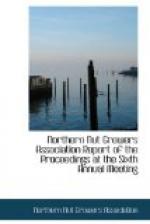I believe that the development of a tree crop agriculture offers one of the greatest possibilities in constructive conservation of natural resources. Individuals cannot be depended upon to do it. The work is too slow. A man might by decades of work create species that would be, if fully utilized, worth a hundred million dollars a year to a state like Pennsylvania; yet he would be unable to realize personal gain from the results, provided he had secured them. Institutions must do it. It is like the Geological Survey and the Census Bureau and Agricultural Experiment Stations, which depend upon appropriations. The appropriations depend upon the realization of the importance of the work. There are interesting examples of similar work already in operation, of which the following might be mentioned: The Agricultural Experiment Station of Arizona has started a twenty-four-year series of experiments in breeding the date palm. In North Dakota, where the blizzards kill nearly all the ordinary fruits, an experimenter has done much work in the breeding of hardy strains of apple, cherry and other trees.
* * * * *
Then followed a display of lantern slides showing scenes from Spain, Portugal, Balaeric Islands, Sicily, Corsica, Italy, Algeria, Tunis, France and southern and central United States. This collection of pictures revealed a surprising amount of tree crop agriculture already worked out but needing wider application.
* * * * *
The meeting adjourned without discussion of either lecture at 10 P.M.
THURSDAY MORNING SESSION
The third session of the convention was called to order at 9:50 A.M. with the president, Dr. J. Russell Smith, in the chair. The opening attendance was twenty-eight persons.
THE PRESIDENT: Owing to the fact that business needs to be predigested, we have decided to postpone the amendments to the constitution until this evening’s session. We think it will take but a short time to discuss them. Resolutions, informal discussion on seedlings, the chestnut, and similar topics will also be brought up at that time. This morning’s session, therefore, will be devoted to the intellectual, rather than the business end.
I know of no subject in which there is greater possibility of securing knowledge than the question of nuts for the north. A few years ago a friend of mine wrote me he had bought some land, and was planting native walnuts in the fence corners to be topworked with English walnuts. I wrote him, recommending oranges instead, telling him he would lose less money. I was basing this advice upon my own bitter experience. The accumulations of nut knowledge in the last few years and the trees now growing on my own place show how ridiculous was my position of a short time ago. This morning I think we are likely to have somewhat similar surprises in a paper by Dr. Morris. He will give us information on the hazel nut, giving his experience with the European varieties.




